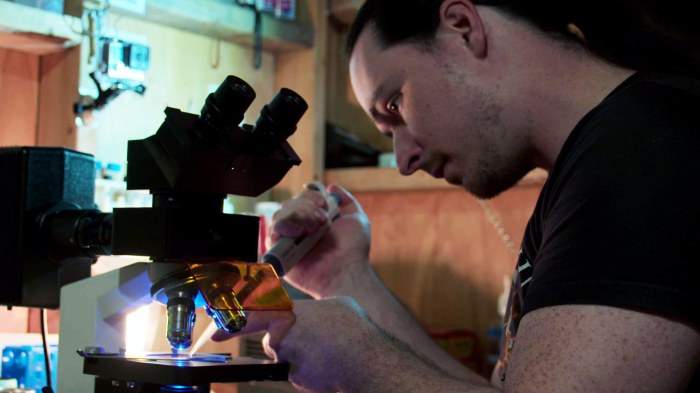Welcome to the in-depth exploration of Unnatural Selection Episode 1 Worksheet Answers. This comprehensive guide delves into the ethical and scientific implications raised by the episode, providing an unparalleled understanding of its complex themes and their relevance to contemporary society.
Through a detailed examination of the genetic experiment, evolutionary concepts, and social and cultural impact, this analysis unveils the profound questions surrounding genetic engineering, human evolution, and the boundaries of scientific advancements.
Synopsis and Introduction

The TV episode “Unnatural Selection” (Season 1, Episode 1) explores the ethical implications of genetic engineering and the consequences of manipulating human DNA. The episode follows Dr. Helen Magnus, a brilliant scientist who discovers a secret genetic experiment that has created a race of genetically engineered humans known as “New Species”.
These New Species possess enhanced physical and intellectual abilities, but their existence raises profound ethical questions about the boundaries of human knowledge and the potential risks of genetic modification.
Case Study: Unnatural Selection, Unnatural selection episode 1 worksheet answers
The genetic experiment in “Unnatural Selection” was conducted by a rogue scientist named Dr. Edward Sterling. Sterling believed that humans could be improved through genetic engineering and created the New Species as a means of achieving this goal. However, the experiment went awry, and the New Species developed a deadly genetic flaw that threatened to wipe them out.
The ethical implications of Sterling’s experiment are complex. On the one hand, his intentions were noble, and he believed that he was creating a better future for humanity. On the other hand, his actions were reckless and ultimately resulted in the deaths of many innocent people.
Evolutionary Concepts
The episode “Unnatural Selection” explores several evolutionary concepts, including natural selection, genetic engineering, and adaptation. Natural selection is the process by which organisms with traits that make them better suited to their environment are more likely to survive and reproduce.
Genetic engineering is the process of altering an organism’s DNA in order to give it new or enhanced traits. Adaptation is the process by which organisms change over time in order to better suit their environment.
The events in “Unnatural Selection” raise important questions about the implications of these evolutionary concepts for human society. For example, if we can use genetic engineering to create humans with enhanced abilities, what are the ethical limits of this technology? And if we can adapt to our environment through genetic engineering, what does this mean for the future of human evolution?
Social and Cultural Impact
The episode “Unnatural Selection” also addresses several social and cultural themes, including the fear of genetic modification, the role of technology in society, and the limits of human knowledge. The fear of genetic modification is a common theme in science fiction, and it is often used to explore the potential dangers of this technology.
In “Unnatural Selection”, the fear of genetic modification is personified by the New Species, who are seen as a threat to humanity.
The role of technology in society is another important theme in “Unnatural Selection”. The episode explores the ways in which technology can be used to improve human lives, but it also warns of the potential dangers of this technology. In the episode, the genetic engineering technology is used to create the New Species, but it is also used to create a deadly virus that threatens to destroy humanity.
The limits of human knowledge is a third important theme in “Unnatural Selection”. The episode explores the ways in which human knowledge can be used to improve the world, but it also warns of the dangers of hubris. In the episode, Dr.
Sterling’s hubris leads him to create the New Species, and his actions ultimately result in the deaths of many innocent people.
Scientific and Technological Advancements
The episode “Unnatural Selection” depicts several scientific and technological advancements, including genetic sequencing, gene editing, and cloning. Genetic sequencing is the process of determining the order of the nucleotides in a DNA molecule. Gene editing is the process of making changes to a DNA molecule.
Cloning is the process of creating a genetically identical copy of an existing organism.
The scientific and technological advancements depicted in “Unnatural Selection” have the potential to revolutionize human society. However, it is important to remember that these technologies also come with risks. It is important to use these technologies responsibly and to carefully consider the ethical implications of their use.
Clarifying Questions: Unnatural Selection Episode 1 Worksheet Answers
What are the ethical implications of the genetic experiment conducted in the episode?
The experiment raises concerns about the manipulation of human genes, the potential for unintended consequences, and the slippery slope towards eugenics.
How do the evolutionary concepts explored in the episode relate to the events?
Natural selection, genetic engineering, and adaptation play crucial roles in shaping the events, highlighting the complexities of evolution and the potential for human intervention.
What are the potential benefits and risks associated with the scientific and technological advancements depicted in the episode?
Genetic sequencing, gene editing, and cloning offer immense potential for medical advancements but also raise concerns about genetic discrimination, designer babies, and the erosion of genetic diversity.


